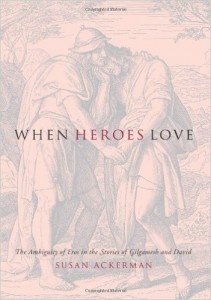 When Heroes Love: The Ambiguity of Eros
When Heroes Love: The Ambiguity of Eros
in the Stories of Gilgamesh and David
by Susan Ackerman
Columbia University Press
336 pages, $45.
“VERY PLEASANT hast thou been unto me,” David laments for his fallen friend and possible lover Jonathan at the opening of the Bible’s Second Book of Samuel; “thy love to me was wonderful, passing the love of women.” The feeling was mutual, for the biblical narrator also records that Jonathan’s soul “was knit with the soul of David, and Jonathan loved him as his own soul.” When King Saul’s murderous jealousy causes his young rival David to flee the court, David and Jonathan suffer a poignant parting at which “they kissed one another, and wept one with another, until David exceeded.”






